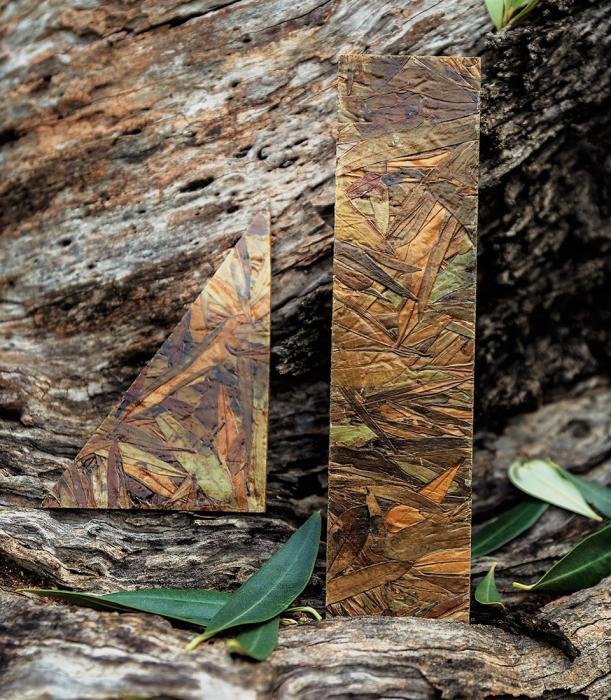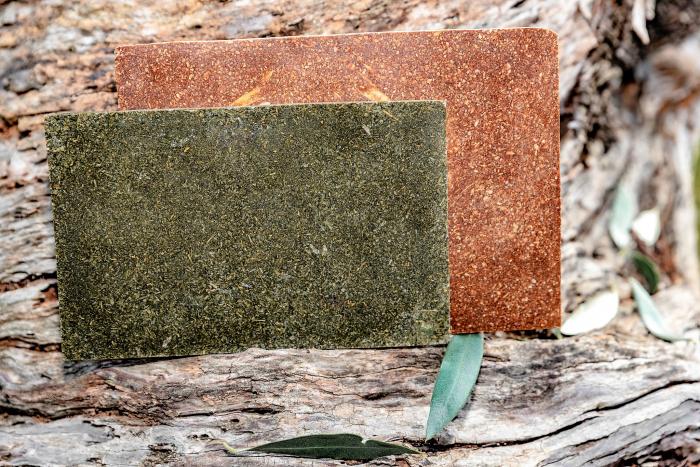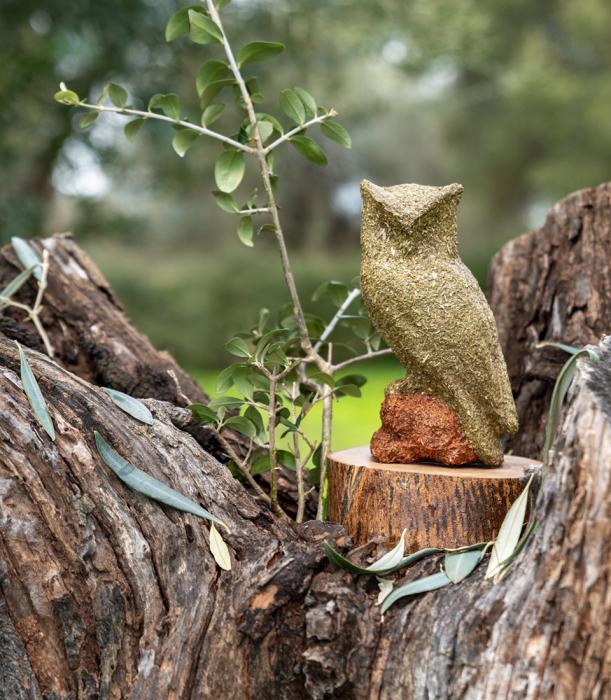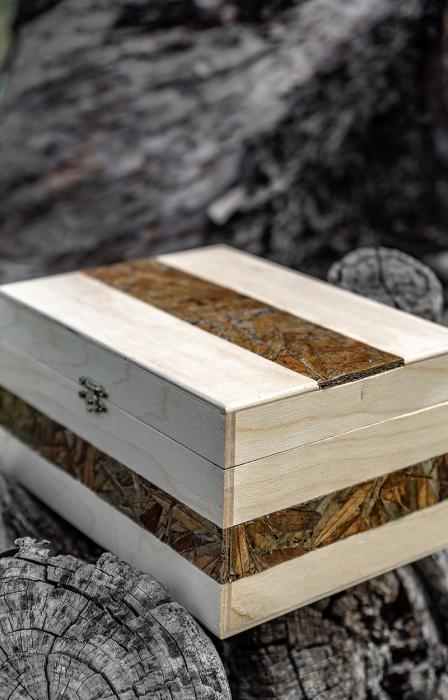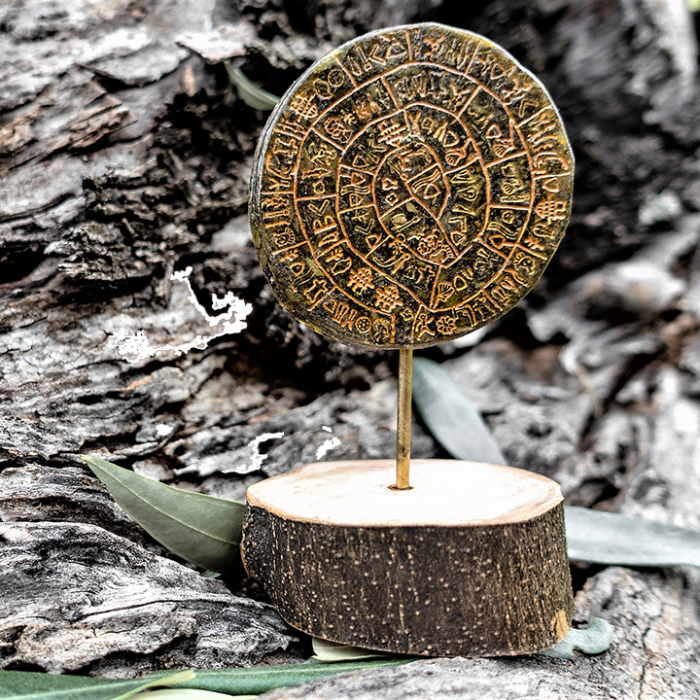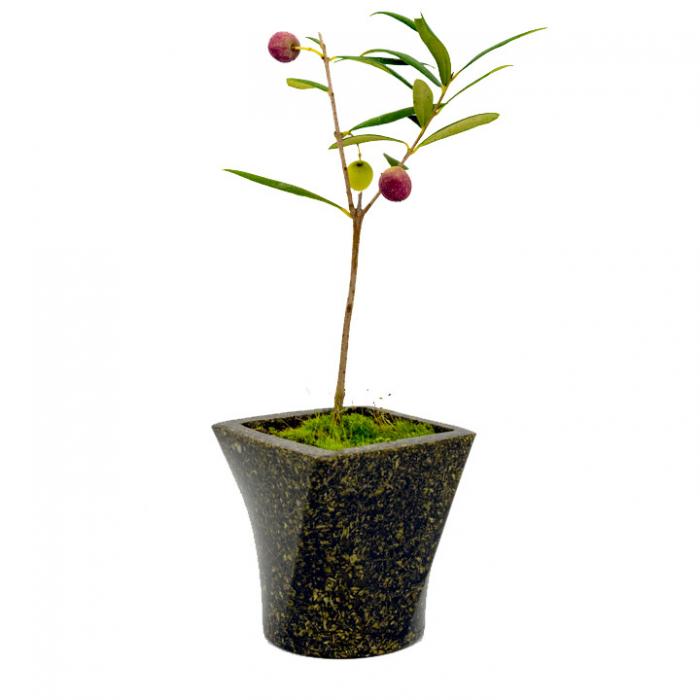I. SUMMARY INFORMATION
Project
267725
Status
Submitted
Award category
Techniques, materials and processes for construction and design
You want to submit
NEW EUROPEAN BAUHAUS AWARDS : existing completed examples
Project title
Liofyllo
Full project title
Liofyllo
Description
Liofyllo, in harmony with the principles of the circular economy, creates a novel eco-friendly material from the untapped olive leaves. Its mission is to manage this biomass that is discarded during the production process of olive oil and replace materials which are not environmentally friendly. This new material is used for a wide variety of constructions, artworks, products and objects.
Where was your project implemented in the EU?
Greece
Western Greece
Dodonis 15
Patras
26334
When was your project implemented?
Has your project benefited from EU programmes or funds?
No
Which programme(s) or fund(s)? Provide the name of the programme(s)/fund(s), the strand/action line as relevant and the year.
II. DESCRIPTION OF THE PROJECT
Please provide a summary of your project
Liofyllo is an idiom to say olive leaf at Greek language. The Social Cooperative Enterprise is in the early stage of creation and development. Liofyllo, in harmony with the principles of the circular economy, creates a novel eco-friendly material from the untapped olive leaves and bio-based or/and biodegradable adhesives. Its mission is to manage mostly the biomass of the olive leaves that is discarded during the production process of olive oil and replace materials which are not environmentally friendly (e.g. wooden panels, plastics, rocks, etc). This new material is used for a wide variety of constructions, artworks, products and objects in order to protect the environment and promote the Mediterranean and, in particular, the Greek culture. Until now, Liofyllo produces the Welia (as wooden panels) and Marelia (as tiles and marble) panels. In addition, it processes panels that are destroyed during the production and reuses them as raw material to create unique pieces of art. The products work as special souvenirs, awards, memorabilia, and works of art.
Production is currently at pilot stage, so, the panels are not for sale yet. One year ago, began the cooperation of the company with a local timber unit, which has 60% of the machinery equipment needed for the production of Welia panels. They are produced at industrial dimensions but in low quantity. Marelia panels are produced just as samples to enter new markets or to find cooperation partners.
Currently, the Liofyllo team creates collaborations for small projects in order to produce various useful objects from its material, such as flower pots, recycling bins, etc., in order to replace the existing plastic products but also to strengthen the ecological consciousness in Greece.
Please give information about the key objectives of your project in terms of sustainability and how these have been met
According to the legislation, the olive leaves are considered non-hazardous solid waste, as the kernel. Most research focuses on the seeds, giving zero importance to the leaves and considering that disposing of them in adjacent fields or burning them is not harmful to the environment. It is estimated that in Greece annually, the volume of this waste reaches 150,000 tons. Liofyllo "exploits" this and creates the eco-friendly material. In addition, Liofyllo, in harmony with the principles of the circular economy, processes the destroyed panels and reuses them to create unique pieces of art, achieving zero waste production.The last 2 years, the amount of 3,5 tons of olive leaves have been recycled, for which the human resources that would be needed for waste management is 50 people. Liofyllo has, also, recycled over 400kg of olive wood and used them as base for the artworks. Finally, the team has donated 15.120€ of its creations to organizations with main objective the adoption of an eco-conscious mentality.
Please give information about the key objectives of your project in terms of aesthetics and quality of experience beyond functionality and how these have been met
Through the appropriate collaborations but also the enormous applications, versatility and potential for product development of the material in various sectors of industry, Liofyllo can be expanded, at least, to the Mediterranean region that has direct benefits from this project (the semantic and timeless value of the olive tree is commonly accepted). In addition, the uniqueness and natural beauty of the material give added aesthetic value to any construction, so that, there is already enough demand from European countries to invest on this project.
Please give information about the key objectives of your project in terms of inclusion and how these have been met
The physiognomy of people is decisively founded, among others, through its relationship with the surrounding area. And if we should give the stigma of Greek nature, naming some fruit trees that influenced the socio-economic reality, the olive tree undoubtedly claims the first place. A tree of the Mediterranean area, it catalyzed the evolution of Greek culture. Its connection with diet and worship is an important phenomenon that penetrates the mythology of the Mediterranean peoples and shapes worship practices, beliefs, customs and habits, many of which are still preserved today. On the other hand the ever-increasing pollution of the environment, leading to inevitable and irreversible ecological disaster, presupposes a bleak future for future generations. In addition, the existence of huge untapped natural raw materials, which are considered as waste and can be exploited and recycled, has led modern research into the development of new innovative materials. Combined with all the above, the idea of creating an environmentally friendly innovative material was born, which is composed of untapped olive leaves, while highlighting the Mediterranean and especially the Greek culture. So, this project has been embraced by people, at least in Greece, and in fact there are many who have supported it with their volunteer work and offer of services and goods.
Please give information on the results/impacts achieved by your project in relation to the category you apply for
The starting point for many green products is to improve an existing product by redesigning aspects of it to address environmental objectives. Sustainable products provide social and economic benefits while protecting public health, welfare and the environment throughout their life cycle—from the extraction of raw materials to final disposal. The environmental legislation has encouraged the design of greener products that tackle specific environmental issues, for example, eliminating the use of certain materials or energy efficiency. The raised awareness of environmental issues is increasing legislation in many countries. This can lead to financial penalties on companies who do not demonstrate environmental responsibility. Many people will not behave responsibly unless forced to do so, therefore, legislation forces the issue.
The design objectives of Liofyllo for green products fall into three categories:
Materials
Ensuring that the packaging and instructions encourage efficient and environmentally friendly use (this can fall under pollution category as well) materials.
Minimizing the number of different materials used in a product.
Labelling of materials so they can be identified for recycling.
Increasing efficiency in the use of materials and resources.
Energy
Increasing efficiency in the use of energy.
Pollution and waste
Ensuring that the planned life of the product is most appropriate in environmental terms and that the product functions efficiently for its full life.
Analysing and minimizing potential safety hazards.
Reducing to a minimum any long-term harm caused by use of the product.
Reducing or negating environmental damage or pollution from the materials selected.
Reducing or negating noise or smell pollution.
Consider the effects of the disposal of the end of life of the product.
Please explain the way citizens benefiting from or affected by the project and civil society have been involved in the project and what has been the impact of this involvement on the project
The usual management of this agricultural waste is its combustion in the yard of the oil mills or in the olive groves. This results in the creation of a suffocating atmosphere from the carbon dioxide emissions during the olive harvest period. It is highly satisfactory for Liofyllo to receive calls from citizens to pick up the branches with the leaves and use them in a different green way. Also, the participation of the team in conferences, exhibitions and events, local or nationwide, awakens the ecological consciousness of the society and gives the stimulus to the citizens to think in an alternative way.
Please highlight the innovative character of the project
The innovation of Liofyllo lies on the use of the untapped natural raw material, (green, or dead, dried, broken or crushed {powdered}) olive leaves, which are discarded during the process of collecting olive oil and other olive derivatives. By this patented procedure, the team creates a new “green” material for constructions. This project is without question a breakthrough in the field of environmentally-friendly materials. Although there are some firms all over the world that claim to be eco-friendly by exploiting untapped natural raw materials, Liofyllo is the first that uses olive leaves in this way. Liofyllo has the exclusive use of this patent (global evaluation by WIPO, national patent by HIPO and pending European and US patent).
Please explain how the project led to results or learnings which could be transferred to other interested parties
As mentioned above, Liofyllo is a project that fits perfectly in the Mediterranean basin. Spain, Italy and Greece are the three big producers of olive oil globally. This means that they have the largest volume of solid waste of the olive leaves. The Liofyllo team could transfer the know - how at other countries to implement the good practices at any appropriate sector. In addition to developing the existing idea, the Liofyllo team wants to awaken eco-awareness at the national level, in the industrial sector (especially olive oil sector), by training executives and founders on the principles of the circular economy. The design and the planning of training workshops will be based on the terms of "environmental protection" and "principles of circular economy". This will be aimed at harmonizing humanity with the planet.
Is an evaluation report or any relevant independent evaluation source available?
III. UPLOAD PICTURES
IV. VALIDATION
By ticking this box, you declare that all the information provided in this form is factually correct, that the proposed project has not been proposed for the Awards more than once under the same category and that it has not been subject to any type of investigation, which could lead to a financial correction because of irregularities or fraud.
Yes
